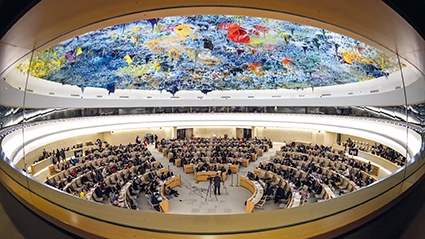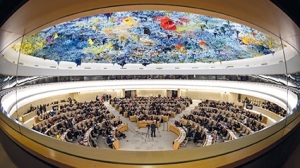UN Human Rights Committee Adopts Resolution on Georgia
The United Nations Human Rights Council adopted a resolution about Georgia’s occupied territories on March 22, at the 40th session in Geneva.
The resolution is called ‘Cooperation with Georgia’ and was supported by 18 in favor to 5 against, with 24 abstentions.
The states which supported the resolution are: Albania, Belgium, Botswana, Croatia, Georgia, Germany, Ghana, Hungary, Japan, Latvia, Netherlands, Panama, Paraguay, Portugal, Slovenia, Togo, United Kingdom of Great Britain and Northern Ireland, and the United States of America.
Bolivia, Burundi, China, Cuba, and Venezuela were against the adoption of the resolution.
Deputy Minister of Foreign Affairs Lasha Darsalia presented the resolution at the UN Human Rights Council session. In his speech he spoke about the close cooperation between Georgia and the Council.
Darsalia informed the delegates about the grave humanitarian situation in Georgia’s Russian-occupied regions of Abkhazia and South Ossetia regions and talked about the alarming tendency of detention of and human rights violations involving Georgian citizens.
In the adopted resolution, the UN Human Rights Committee once again expresses support for Georgia's sovereignty and territorial integrity within its internationally recognized borders.
The Council also expresses serious concern at the continuous process of installation of barbed wire fences and different artificial barriers along the administrative boundary line in two breakaway regions of Georgia.
The document welcomes the cooperation of the Government of Georgia with the Office of the United Nations High Commissioner for Human Rights and other human rights, regional and international mechanisms and recognizes the efforts of the Government of Georgia for strengthening democracy, the rule of law and human rights in the country.
In addition, the Council express serious concern about the cases of discrimination, violation of the right to life, deprivation of liberty, illegal detention and abduction, violation of property rights and the right to health, as well as restriction of the right to get education in the mother tongue and demolition of IDPs’ houses in breakaway Abkhazia and South Ossetia.
The Council also emphasized the importance of the Geneva International Talks, launched on the basis of the 12 August 2008 ceasefire agreement, and expressed concern over the fact that IDPs and refugees were still unable to safely return to their homes.
The document expresses concerns that regional and international monitoring mechanisms are not allowed to enter Abkhazia and Tskhinvali regions.
The resolution asks for immediate access of the High Commissioner's office and other monitoring mechanisms to the occupied regions.
Ketevan Tsikhelashvili, State Minister for Reconciliation and Civil Equality, said the resolutions adopted by the United Nations Human Rights Council serve as important and efficient mechanisms to keep the international community regularly informed about the situation across Georgia’s occupied regions.
The Minister said the UN is an organization which will repeatedly remind Russia of its internationally taken commitments from its tribune.
By Thea Morrison
Image source: wlrn.org












